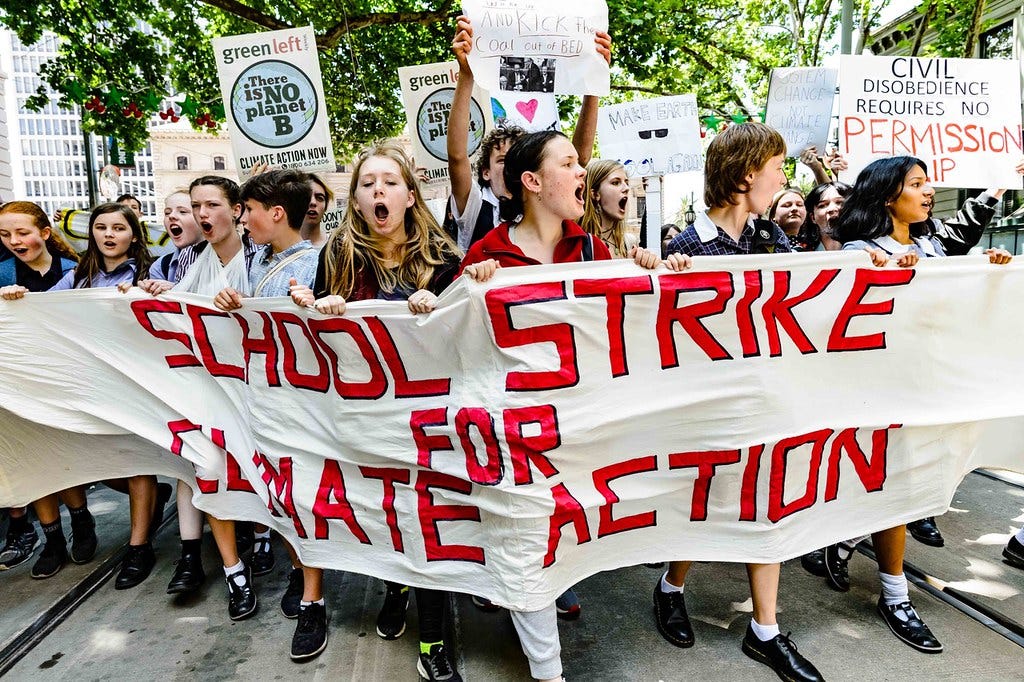10 March 2022. Fertility | Transparency
Climate change is influencing fertility decisions. Are we at ‘peak transparency’?
Welcome to Just Two Things, which I try to publish daily, five days a week. Some links may also appear on my blog from time to time. Links to the main articles are in cross-heads as well as the story. Recent editions are archived and searchable on Wordpress.
Looking at my schedule, it’s possible that I won’t manage a Just Two Things tomorrow. If not, there will be a Saturday edition.
1: Climate change is influencing fertility decisions
I don’t normally turn to Marie Claire for my futures research, but they have a piece published last month that uses survey data to suggest that American women are having fewer children because of concerns about climate change.
58 percent of women have adjusted their family planning because of concerns about climate change, according to a new survey conducted by reproductive health company Modern Fertility and shared with Marie Claire exclusively. These women are worried, in particular, “about the world (their) kids will inherit,” per the results. A third say they want to have fewer children because of it.
It’s not clear how the survey was conducted or analysed, and that 58% figure is actually a little misleading, since a sizeable minority within the survey say that climate change has accelerated their timeline for having children,
either because it’s refocused what’s important to them (17 percent) or added a sense of urgency (14 percent).
The different attitudes skew strongly by income:
Low-income earners were more likely to say they plan to have kids sooner—22 percent of respondents who make less than $50,000 compared to just 7 percent of women making $200,000 or more.
The article speculates that this might be down to pessimism about economic prospects longer-term, or about the costs of extreme weather. But it’s pretty clear that this is just speculation.
(Melbourne school strike for climate action. Beyond Coal and Gas Image Library/flickr. CC BY 2.0)
There are two other interesting findings in the piece. The first is that women are considering the planetary impact of having children, and that this is translating into an increased interest in adoption:
More than a quarter of respondents say they have considered adopting, rather than having biological children. The survey showed a statistically significant difference between the feelings of Gen Z and Millennials—32 percent to 25 percent, respectively.
But we don’t have a figure in the piece for whether than ‘quarter of respondents’ is higher or lower than it used to be. All the same, the difference between Gen Z and Millennials would certainly be worth tracking over time.
“Gen Z is acutely aware of the climate crisis in ways that other generations at the same reproductive age were not,” says Jane Van Dis, an ob-gyn (obstretic gynaecologist) and founder of Time’s Up Healthcare. “(Gen Z sees the news) that not having a child limits the amount of carbon that they are personally responsible for.”
I hadn’t realised that Time’s Up Healthcare was a thing, but a quick search helped. It makes sense:
Women make up nearly 80 percent of the health care workforce, but only 20 percent of the decision makers — including hospital leadership, executives, and association presidents — are women. And sexual harassment and gender discrimination run rampant: Researchers estimate that 50 percent of female medical students will experience harassment before they even graduate.
But back to Marie Claire again. One of the issues that this throws into the light is the balance between individual responsibility and social responsibility. Women end up wresting with individual choices while governments and industry, such as the fossil fuel sector, don’t do enough to rein in climate change:
Adds Dr. Van Dis, “There’s a lot of tension in terms of what is a personal responsibility versus what is a societal responsibility.” It’s clear that women are thinking about their own accountability: Nearly 40 percent said that it feels “irresponsible or unethical” to continue to bring more children into the world with the problems our planet is already facing.
2: Have we passed ‘peak transparency’?
Geoffn Mulgan asked an interesting question on his blog last month: have we reached peak transparency?
The idea that if things are more transparent the world would be a better place has been a strong one over the past few decades, and it has deep roots in Enlightenment thinking:
In the 19th century, Jeremy Bentham had argued that “without publicity, no good is permanent; under the auspices of publicity, no evil can continue”. John Stuart Mill advocated “unbounded publicity” and believed that a “marketplace of ideas”, with free and open competition, would bring the world closer to truth...And in governance, many took to heart Louis Brandeis’ famous comment that “sunlight is … the best of disinfectants”, such that it has become an article of faith that more transparency reduces corruption and abuses of power.
Mulgan then lists four areas where he thinks we are moving away from transparency as an organising principle.
The first is technology:
The technologies on which we depend everyday are ever-less comprehensible and ever-more like black boxes. Artificial intelligence is becoming harder to understand even for the programmers... Algorithms now learn as much as they are programmed, and they interact with each other in ways that are hard to map.
—
(Black box. Photo by Thierry Ehrman/flickr, CC BY 2.0)
There are attempts to constrain this—for example the EU is trying to ensure that algorithms are transparent. But this is going to be a battle. These are complex technologies, rather than the ‘complicated’ technologies of the electro-mechanical age.
The same is true, he says, of government and public policy, where governments are rolling back legislation about freedom of information, and so on. I’m less persuaded by the evidence here. Yes, of course Putin, Modi, or Trump are hostile to transparency. And quoting Tony Blair’s memoirs as saying ‘that he had been a “naïve, foolish, irresponsible, nimcompoop” to have introduced (Freedom of Information’, is hardly convincing by way of evidence, given his essentially authoritarian instincts.
But it is worth noting that there’s less transparency around public R&D, in response to geopolitics.
Business, of course, is also moving away from transparency. Again the evidence is less convincing here, and seems to be more of a reprise of the tech argument, given that there are trends, as he notes,
to open up accountability, and to make the environment and social impacts of business more visible. Projects like Open Corporates or the Panama Papers shine a light on activities and abuses.
Although he could have mentioned the trend of taking companies private—without a stock market quotation—to escape the scrutiny that comes with being a publicly quoted company.
The fourth example is the various networks and supply chains that we depend on:
These are harder to grasp, more brittle and more surprising than their equivalents in the past. As a small experiment: Just ask a well-educated person... to describe the supply chain for something like a car or computer. Or try to find out for yourself how the vital networks around you function day to day – from food supplies to money. You soon discover that these essential infrastructures are far less transparent than you expect.
So how should we respond to this? We could try to double down on the principles of liberalism, and many have been doing this: “We can try to open up all the black boxes. But this may be a losing game.”
We could reinforce public institutions:
more citizen science, open-source intelligence, and also beefing up institutions that can explain and interpret. This seems to me a valid position, and it justifies ensuring that organizations like the BBC or PBS are well-funded, and that the communication of science and technology is seen as a vital public service.
Similarly, strong public institutions can anticipate the direction of more secretive behaviour rather than responding to it. These would
observe, interpret and watch for risks and unintended consequences, rather than just relying on laws that quickly get superseded. This is the direction of travel for the regulation of AI in China and the EU.
Some of these things seem to me simply to be about power, and attempts to hang on it by businesses and governments. Others seem to be about increasing complexity—it’s possible that as a society we’re approaching “peak complexity”, given how vulnerable our systems are to extreme weather, pandemic, and similar shocks.
And Mulgan’s last paragraph touches on ideas of managing in the face of complexity:
we need, more than ever, to bolster the forces of light against darkness, of transparency against secrecy. But we also need to be more humble and realistic about our ignorance than the champions of rationalist enlightenment imply. After all, wisdom is not just about what you know, but also about what you know you do not know.
Ukraine notes:
The journalist Hugh Barnes has a piece on the LRB blog about being suspected as a Russian spy in Zaporizhzhia, home to the nuclear power station captured by the Russians. Probably his fault: he was taking pictures of a wall, and had a map annotated in red on his phone. He was saved by Wikipedia.
The piece also introduced me to a lovely set of variations on Gershwin’s ‘The Man I Love’, possibly my favourite Gershwin song, by the Ukrainian composer Alexander Tsfasman.
j2t#277
If you are enjoying Just Two Things, please do send it on to a friend or colleague.


